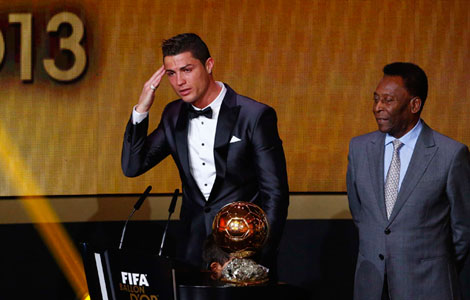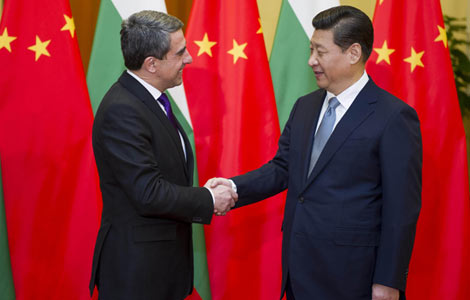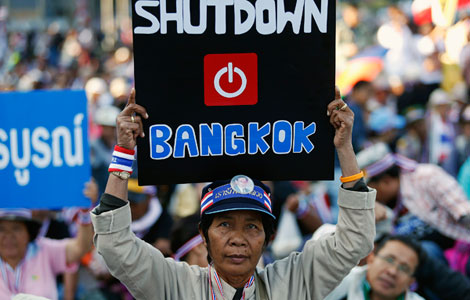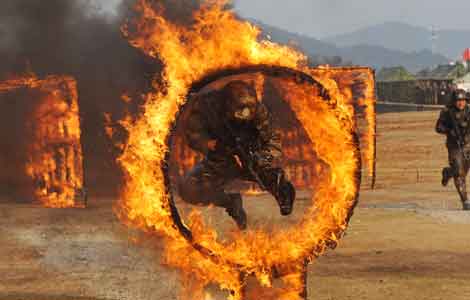Triumph of diplomacy
Updated: 2014-01-14 07:41
(China Daily)
|
||||||||
Calling Sunday's agreement between Iran and the P5+1 "an important step forward", US President Barack Obama emphasized that "now is the time to give diplomacy a chance to succeed". Yet he credited "unprecedented sanctions and tough diplomacy" for the development.
Harsh US sanctions, the main cause of Iran's current economic woes, indeed compelled Teheran to make concessions at the negotiating table. But the Geneva talks would not have reached where they are were it not for the shared willingness to give diplomacy a chance.
The Sunday deal is, in US Secretary of State John Kerry's words, a "critical, significant step". By agreeing on how to implement the first phase of the agreement reached on Nov 24, the negotiators indicated that the fragile diplomatic process to resolve the Iranian nuclear issue remains on track. It inspires optimism about a longer-term deal in the near future, too.
Given the less-than-desirable outcomes of recent US military interventions in the Middle East and beyond, a diplomatic solution to the Iranian nuclear issue is of particular significance for Washington's foreign policy.
The Iraq War has been an absolute failure for the US and a nightmare for Iraqis. It has exposed the moral hollowness of the US' Middle East policy and is a bloody illustration of its ineffectiveness. The promised democracy after regime change is still a daydream in Iraq, where national reconciliation remains illusive, violence rules everyday life and terrorism grows ever stronger.
Things are hardly better in Afghanistan, where people fear the worst following US military withdrawal later this year.
Obama seems to have learnt a lesson from his trigger-happy predecessor's failures in Iraq and Afghanistan. His interest in negotiating with Iran is an encouraging break worth an active response from Teheran and the broader international community.
The so-far-so-good diplomatic progress on Iran and Syria indicates the handsome reward diplomacy can deliver. But both processes remain volatile, and the deep-rooted distrust accumulated over the decades could derail them at any time. The US Senate bill to impose fresh sanctions on Iran, for instance, has the potential to invalidate all previous peacemaking efforts.
As US National Security Council spokeswoman Bernadette Meehan correctly pointed out, closing the door on diplomacy would very possibly leave her country to "choose between military options or allowing Iran's nuclear program to continue".
For all parties' benefit, diplomacy has to succeed.

 Cristiano Ronaldo wins FIFA best player award
Cristiano Ronaldo wins FIFA best player award
 Xuelong carries on mission after breaking from floes
Xuelong carries on mission after breaking from floes
 Beijing and Sofia vow new initiatives
Beijing and Sofia vow new initiatives
 71st Golden Globe Awards
71st Golden Globe Awards
 Bangkok unrest hurts major projects and tourism industry
Bangkok unrest hurts major projects and tourism industry
 No pant for cold subway ride
No pant for cold subway ride
 Tough army training turns boys into men
Tough army training turns boys into men
 Blaze prompts concern for ancient buildings
Blaze prompts concern for ancient buildings
Most Viewed
Editor's Picks

|

|

|

|

|

|
Today's Top News
Jackson's family bid for new trial denied
Newspapers must change or die
Abe’s brother to explain shrine visit to US
Protests cannot end Thai deadlock: observers
Mercy killing still a hot button issue
China builds army 'with peace in mind'
UN plea made on war victims
Li: China's tech innovation a priority
US Weekly

|

|






